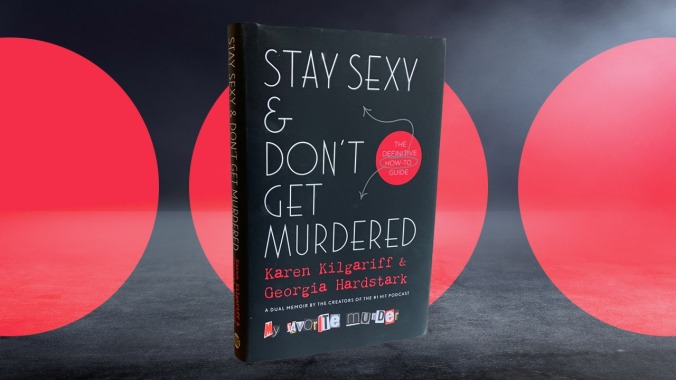Who would take advice from a couple of death-obsessed misfits? Other death-obsessed misfits, that’s who. They (we) are, in fact, legion, as Karen Kilgariff and Georgia Hardstark discovered after their podcast, the comedy-true crime hybrid My Favorite Murder, became a full-on pop cultural phenomenon. Now, the duo have their own podcast network, as well as tens of thousands of devoted fans who proudly refer to themselves as “Murderinos.” And as the podcast’s fandom has grown, so has its scope, encompassing conversations about mental health as well as true crime. Now, that expanded mission culminates with Kilgariff and Hardstark’s new “dual memoir,” Stay Sexy & Don’t Get Murdered.
Although it’s organized around quotes from the podcast that have become holy commandments in the cult of Karen and Georgia—“Fuck politeness,” “You’re in a cult, call your dad,” “Stay out of the forest”—the chapter titles in Stay Sexy & Don’t Get Murdered are often only tangentially related to the content of said chapters. In fact, it’s almost humorous when the book does come back around to true crime toward the end, the kind of “Oh, right, what were we talking about again?” moment you might have with a friend when you realize the conversation has gone way off topic. For although the podcast is the reason that this book exists in the first place, its real purpose is to get the hosts’ most salient and hard-earned lessons into print, where readers can go back to them when life kicks the shit out of them, too. As Kilgariff writes in “Karen’s Lecture On Self-Care”:
I’m talking about the fuckups and the drama queens, the ones who get told they’re too much: too big, too loud, too smart, too mean. I’m talking to the people who have been severely scraped up by life and by the mistakes they’ve made in it. You guys are my favorite because you are me and I am you.
The book is at its best in earnest passages like these, whether that comes in the form of a detailed 10-step breakdown of what to expect when going to therapy for the first time or a devastating personal anecdote about a close call with a predatory stranger. Both of those come from Hardstark, who plays the role of excitable younger sister to Kilgariff’s cynical, wise Gen-X aunt. (Sorry, Georgia. We know you want to be a cool Gen-Xer too, but you’re just too optimistic. It’s the plight of all us elder millennials.) It’s the same dynamic they have on the podcast, which is faithfully reproduced here not only in tone but also in structure. Stay Sexy & Don’t Get Murdered is written like a conversation between best friends, complete with sidebars, and both women’s personalities translate very strongly (and warmly and charmingly) to the page through their first-person stream-of-consciousness writing styles. If occasionally the jokey bits that punctuate the heartfelt confessions come across as slightly distancing, well, they warned you a few pages earlier they had a shared neurotic impulse to fill awkward silences with nervous chatter.
Honestly, it’s for the best that Stay Sexy & Don’t Get Murdered isn’t a collection of “murders” from the podcast, not least because there’s no shortage of better researched, more detailed true-crime stories out there. (That’s not a dig: Both Kilgariff and Hardstark freely acknowledge, both on the podcast and in this book, that they mix up dates and mispronounce names all the time.) Here, in the realm of memoir, they’re less encumbered by fact-checking, and free to engage in their biggest strength, which is radical vulnerability. Hardstark’s and Kilgariff’s different personalities and life experiences complement each other quite nicely in this regard, as Hardstark’s self-confessed juvenile delinquency has more to teach teenage readers, and Kilgariff’s long climb out of the cold, shit-filled hot tub of addiction—her words, not ours—reassures older ones that they’re not worthless simply because they didn’t have it all together by the age of 25.
What makes this advice effective is the tone with which it’s conveyed: Even in an age defined by oversharing, Hardstark and Kilgariff’s casual mentions of “my eating disorder” or “my financial crisis” throughout the book are staggering. Lots of people will tell you that there are no real shortcuts to happiness, that if you don’t believe in yourself no one will, and so on. But Hardstark and Kilgariff do so with such specificity and openness that you actually believe them. This isn’t a one-and-done Instagram post written to elicit comments about how brave the poster is. It’s a lifelong process. It seems that, in a winding and unexpected sort of way, the patients have become the therapists—but if there’s one thing to take away from this book, it’s that you should really also get an actual therapist.

 Keep scrolling for more great stories.
Keep scrolling for more great stories.
